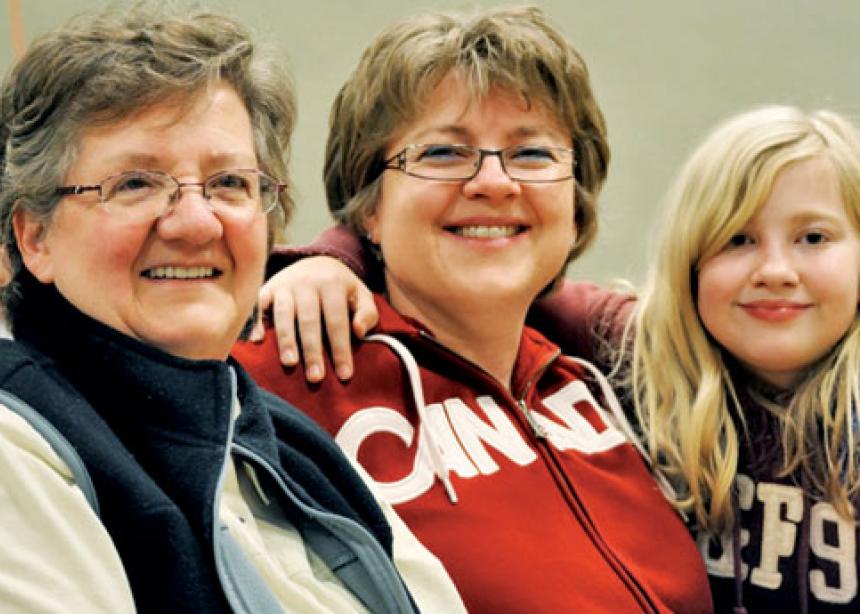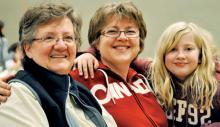Committee meetings have a reputation for being necessary but tedious. But at Foothills Mennonite Church, Calgary, there is a standout exception to the rule in the Women Intergenerational from Seniors to Kids (WISK) group.
“For me, the committee is the source of great excitement,” says Kate Janzen.
“The WISK committee is really fun”, adds Becky Andres.
June Miller feels blessed by the group. “Our meetings are not just about planning another event, but a gathering of friends who share a passion for Jesus,” she says.
After studying away from home for eight years, Megan Enns says that being on the committee has “instantly connected me with four different age groups in the church.”
Janzen remembers a January 2011 congregational meeting at which the board asked what could be done to build relationships at Foothills. “I said I had a vision for bringing the women in our church together in some way,” she says.
The board encouraged her, and WISK was born. The group invites women from six to 106 to get together twice a year for fellowship, fun and belonging, and seeks to cultivate authentic relationships among women of all ages.
The first event, a strawberry tea, attracted almost 100 women. It featured deliberately intergenerational seating at tables, entertainment and food. A number of women brought old dresses, such as bridesmaid dresses, and told the stories behind them.
The latest event, “Mennonite Girls Can Cook,” was held last November. The turnout was exceptional again, with 100 women attending the event named after the title of the recently published book, which was for sale there.
Alice Unrau, another WISK committee member, describes this evening, saying, “We began by having women/girls of each generation sit at a table and decorate aprons. . . . It got the girls and women chatting with each other. We then had two women demonstrate some of their recipes. In order for all the women to see, we had set up a camera and a screen. While that was happening, we had cupcakes for the girls to decorate, which we later had with our coffee. What struck me about it was how interested the girls, especially the junior and senior high kids, were in coming to this event.”
Miller speaks highly of the way intergenerational relationships impacted her faith development. “As a child growing up, it was the ‘grandmas’ in my church that heavily influenced my life,” she says. “They were more than Sunday school teachers, children’s club leaders, youth leaders for me and my siblings. They were the ones who cared and invested in our lives, our spiritual champions at a time when my mother did not know the Lord. In turn, it was us kids who brought our mother to the Lord.”
While relationships like these are often important, and desired, people commonly feel hindered in developing intergenerational connections outside of family circles. “There is a wrong preconceived notion that the young don’t care about older people and that older people think young people don’t care about them,” Janzen says.
The success of WISK comes at a time when more established women’s groups, such as sewing circles and mission groups, struggle to remain viable and attract young members. Janzen, who is also an enthusiastic supporter of the Mennonite Women Canada organization, says that the frequency of WISK events encourages participation. “Our original women’s group was every month,” she explains. “Times have changed and people don’t want to make that kind of commitment.”
The committee acknowledges that two events per year is not enough to build relationships, so it has a vision to encourage the addition of Bible studies and service opportunities. “This is just a starting-off point,” Janzen says. “We want people who come to this to get a sense of the larger church.”
Doug Klassen, pastor at Foothills, is a strong advocate of what WISK is doing to bring women of all ages together. In a Feb. 12 sermon, he encouraged men of the church to consider something similar, saying, “Men have really lost the roles they’ve played in the past.” Klassen says that Foothills is in the preliminary stage of forming a Men and Boys Association (MBA), so intergenerational fellowship and mentoring could occur for them. “Some thought we should call ourselves the ‘WISKers,’” Klassen says with a laugh.
Asked if she had encouragement or advice to offer to other congregations thinking about establishing an intergenerational fellowship, Enns says, “Do it. It’s fun, and if you get to do it, be on the planning committee. You get the most out of it when you are involved.”
WISK women’s group bridges the age divide
February 29, 2012 | God at work in Us | Number 5
By Donita Wiebe-Neufeld | Alberta Correspondent
Susan Nielsen, left, a member of Foothills Mennonite Church, Calgary, brought her neighbours Melanie and Kayla Beingessner to the “Mennonite Girls Can Cook” event last fall. “It was a great event,” says Melanie. “I hope she invites us to the next one.”



Add new comment
Canadian Mennonite invites comments and encourages constructive discussion about our content. Actual full names (first and last) are required. Comments are moderated and may be edited. They will not appear online until approved and will be posted during business hours. Some comments may be reproduced in print.